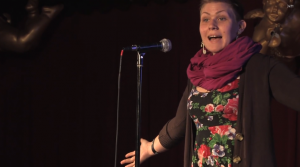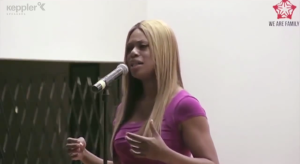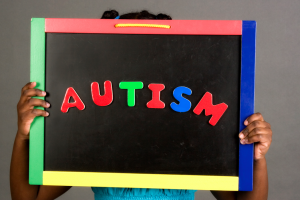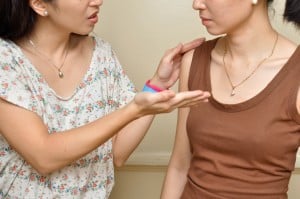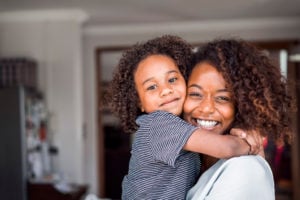
A child hugs their smiling parent.
(Content Warning: menstruation)
I first started menstruating when I had just turned twelve.
I was over a thousand miles away from home on a fourteen-day Scout jamboree. I was sleeping in a tent with girls who I had only met a couple of days ago, and I had no idea what was going on.
I knew all about menstruation, in theory. I had been given books about the human body and had puberty explained at school in health class.
The problem was, what I experienced didn’t match what I had seen in the books.
I expected to see red blood coming out of me, not brown smudges on my underpants. I was really concerned that I was just not wiping my backside correctly and for some reason, I kept finding unexplained “poo” smudges in the front of my underpants.
Finally, I found the courage to ask my tentmate if she had any issue like this – maybe it was the toilet paper or some issue with the camp food?
Luckily, she had already started menstruating a year ago and could explain what was going on.
She didn’t, however, explain that disposable sanitary pads were designed to stick onto the gusset of your underpants – not your genitals. That was an uncomfortable error that I’ve never forgotten.
I also never forgot how confused, alone, and worried I felt during my first period. So when I started my career in health promotion, I saw an opportunity to bring discussions about menstruation into my work, as it seemed to be a conversation that stopped after the age of 12 for most sexual health educators.
As a parent of three cis girls (as far as I know), I want to try and make their experience of menstruation more straightforward and less confusing than what I went through.
Here is my caveat: My kids – a five-year-old and twin two-year-olds – are still young, so none of them have started menstruation (thankfully). This means that the things I’m suggesting in this article sound like a good idea to me, but I won’t know that they’ll have a positive impact on how my own kids experience menstruation for (at least) a few years.
Historically speaking, in my culture, menstruating people were given information about their changing bodies from their caregivers. So the quality of information varied widely between people, as caregivers would choose what information was valuable and what was “unnecessary” or “inappropriate.”
Lack of information about any subject can lead to confusion, fear, and misunderstandings. So, no wonder you can easily find so many people who had horrifying experiences when they first started menstruating – they weren’t given accurate information!
Menstruation isn’t a punishment or something to be ashamed of. It’s a normal bodily function, and the more we can normalize and understand the diversity of experiences around menstruation, the more secure our kids will be within their changing bodies.
Change is hard. Puberty is one of the big unknowns in a young person’s life. You don’t know what it will feel like for you, when it will happen, or how your body will or won’t change.
Nowadays, in my culture, it seems more socially acceptable for parents and schools to equip soon-to-be menstruating kids with information about what to expect.
However, often, this information is dry, theoretical knowledge with textbook-style anatomical images. This is helpful, but only up to a point.
To give kids the best chance to understand the concept of menstruation, as well as the possible issues they may encounter, the theoretical information needs to go hand-in-hand with qualitative data about menstruation experiences – ideally from a wide range of people with diverse menstrual experiences, including people within the child’s family.
If I had known that when my biological mother first started menstruating, it looked like mine did (and she was away on camp), then I probably would have understood what was going on with me.
She figured the dark smudges she was finding was due to wearing black underpants and didn’t ask for help, despite her confusion and worry. She thought that she was doing something wrong and she needed to “fix it” – kind of like I did.
Just as there is no hard and fast rule as to when (or if) children will reach other developmental milestones like walking, losing their first tooth, or knowing their own name, the same is to be said about one’s first period.
But one thing we do know is that it can come earlier or later than you as a caregiver expected.
So with that in mind, here are four suggestions for discussing menstruation with your kids.
1. Start Early
It’s very common for children to be curious about their own body and the bodies of people close to them. Think of how babies will grab at noses and poke people in the eyes, or how toddlers will often not want you to go to the bathroom without them (oh, how I long to pee alone!).
If, like me, you now have company whenever you use the bathroom, you can use this time to explain what is going on.
Many people already use this time to role model positive behaviors that they want to encourage in their children, like using the toilet, washing hands, or not using too much soap or water.
This is a great time to include a quick anatomy lesson and normalize what’s going on.
“I’m going wee from my urethra” can turn into talking about what you do in terms of wiping, shaking, and rinsing. “I have blood on my labia” can turn into talking about what you do – like free bleeding, reusable menstrual products, or disposable menstrual products, for instance.
To begin with, you’ll need to assure the child that you’re fine, as many kids might assume that blood means you’re injured. It’s great to get them to understand that blood doesn’t necessarily mean that someone is hurt!
This can lessen the fear they have of blood or injuries that they’ll undoubtedly experience as they travel through childhood. It will also mean they’ll probably not be terrified that they are bleeding to death if they experience menarche (like many people have in the past).
I’m not saying that you need to drag your child into the bathroom and give them a tour of your anatomy.
But if they’re running in after you anyway, you can use it as a teachable moment to answer their questions without euphemisms and as simply as possible.
2. Be Thoughtful About the Language You Use
Language matters.
There are a lot of phrases around menstruation that can instill a sense of fear, shame, or confusion about this very common biological process.
Honestly, the phrase “crimson tide” messed up my expectations about just how much blood I was going to lose! So be mindful of how you talk about menstruating, which includes using inclusive language and pronouns.
The euphemisms “lady days/times” assumes that only “ladies” experience menstruation – which is patently false.
Remember menstruation happens to lots of people, regardless of gender identity.
In our house, I’ve explained this thusly: “Most people with a uterus menstruate.”
Then I go on to explain that menstruation usually happens once a month and lasts a week or so, that it doesn’t start happening until you’re between the ages of 8 and 18, and that it stops anywhere from the ages of thirty through sixty.
This ongoing conversation with my five-year-old has been great for reinforcing the idea that there is no such thing as “normal.”
There’s simply a sliding scale of how others experience the same things as you.
3. Encourage Curiosity
If my kid wants to know what I’m putting in my shopping basket, then I’m going to tell them. It’s as simple as that. From a toothbrush to a tampon, they both have a reason to be in my basket – and to be explained simply to my children.
Keeping menstruation products hidden from kids can increase the mystery, fear, and even eventual misuse of these products.
I can’t have been the only one who was told to read the instructions in a box of tampons and got very confused about what goes where, and which bit gets thrown away, right?
We don’t do euphemisms in our house. We don’t have “mummy’s special stickers” (disposable menstrual pads) or the like.
My five-year-old knows what products I use and that they are not for playing with. They have a purpose. And if she wants to know more about them, all she has to do is ask.
Remember that the conversation about menstruation doesn’t belong in a one-off lecture about puberty: This is an ongoing conversation that is always open for exploration!
4. Talk About Family History
If you’re fortunate enough to have biological family members who are able and willing to talk to you about your family history of menstruation, I would highly suggest you give it a try.
Even if you think the idea of a conversation with a family member about this topic would be super awkward (and I’m not saying it won’t be), just think about what you could get out of it:
- a shared sense of history
- a better understanding of a particular stage of their life
- an understanding of how your body is or is not like theirs
- knowledge that your experiences with menstruation are (or aren’t) common within your family
- ideas for what worked and what didn’t for common menstrual issues experienced
- a foundation of knowledge to share with your children about the diverse experiences that people in their family have experienced when it comes to menstruation
This way, no matter what they experience, they can see that they’re not alone. Their family history can prepare them for whatever their period has in store for them.
If you menstruate, or have in the past, then I would encourage you to share stories about your menstruation experiences with your kids – the same way you would talk about other important moments in your life that your kids might find anxiety-producing, like losing your teeth, starting school, or moving homes.
Normalization of menstruation – and the issues that can come with it – can make the whole process of it a lot less confusing!
So even though my five year old has just told the whole queue of people at the supermarket that “Mummy has blood, but no babies, in her uterus, that’s why she’s buying tampons,” I’m glad she knows what’s going on with my body.
And I hope it helps her if and when she has blood, but no babies, in her uterus, too.
[do_widget id=’text-101′]
Rebecca Leys is a health promoter and a stay at home mum of three precocious girls living in Aotearoa. Her focus is on unpacking privilege as a parent, positive body image, sex, and dismantling rape culture. She loves tattoos, cooking, and playing board games.
Search our 3000+ articles!
Read our articles about:
Our online racial justice training
Used by hundreds of universities, non-profits, and businesses.
Click to learn more





